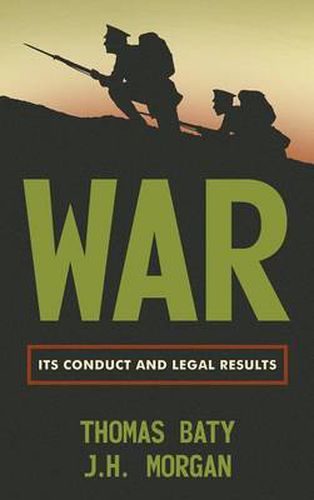Readings Newsletter
Become a Readings Member to make your shopping experience even easier.
Sign in or sign up for free!
You’re not far away from qualifying for FREE standard shipping within Australia
You’ve qualified for FREE standard shipping within Australia
The cart is loading…






This title is printed to order. This book may have been self-published. If so, we cannot guarantee the quality of the content. In the main most books will have gone through the editing process however some may not. We therefore suggest that you be aware of this before ordering this book. If in doubt check either the author or publisher’s details as we are unable to accept any returns unless they are faulty. Please contact us if you have any questions.
Legal Ramifications of the First World War. Originally published: New York: E.P. Dutton and Company, 1915. xxviii, 578 pp. The authors argue that the First World War effectively ended the existing system of international law, a system that was already in decline due to the growing economic and political interdependence of states. These changes have created a new set of problems that will provide the basis of a new system of international law when the war ends. In addition to supplying an intellectual framework for this new system, Baty and Morgan address practical topics, such as international arbitration, and more abstract issues, such as the clash between nationalism and cosmopolitanism. [V]ery good reading….It is a thoughtful book. –T.S.W., Yale Law Journal 19:313-314.
THOMAS BATY [1868-1954] taught law at Oxford University and was a joint secretary of the International Law Association. In 1915, the year War was published, Baty became the foreign legal advisor to the Japanese government and moved to Japan. He is also the author of the well-known work, International Law (1909) and International Law in Twilight (1954).
J.H. MORGAN [1876-1955] was a Liberal candidate for Parliament in 1910. A legal editor of the Encyclopedia Britannica (14th edition), he was professor of constitutional law at the University of London and legal adviser to the War Crimes Commission at Nuremberg from 1947 to 1949.
$9.00 standard shipping within Australia
FREE standard shipping within Australia for orders over $100.00
Express & International shipping calculated at checkout
This title is printed to order. This book may have been self-published. If so, we cannot guarantee the quality of the content. In the main most books will have gone through the editing process however some may not. We therefore suggest that you be aware of this before ordering this book. If in doubt check either the author or publisher’s details as we are unable to accept any returns unless they are faulty. Please contact us if you have any questions.
Legal Ramifications of the First World War. Originally published: New York: E.P. Dutton and Company, 1915. xxviii, 578 pp. The authors argue that the First World War effectively ended the existing system of international law, a system that was already in decline due to the growing economic and political interdependence of states. These changes have created a new set of problems that will provide the basis of a new system of international law when the war ends. In addition to supplying an intellectual framework for this new system, Baty and Morgan address practical topics, such as international arbitration, and more abstract issues, such as the clash between nationalism and cosmopolitanism. [V]ery good reading….It is a thoughtful book. –T.S.W., Yale Law Journal 19:313-314.
THOMAS BATY [1868-1954] taught law at Oxford University and was a joint secretary of the International Law Association. In 1915, the year War was published, Baty became the foreign legal advisor to the Japanese government and moved to Japan. He is also the author of the well-known work, International Law (1909) and International Law in Twilight (1954).
J.H. MORGAN [1876-1955] was a Liberal candidate for Parliament in 1910. A legal editor of the Encyclopedia Britannica (14th edition), he was professor of constitutional law at the University of London and legal adviser to the War Crimes Commission at Nuremberg from 1947 to 1949.